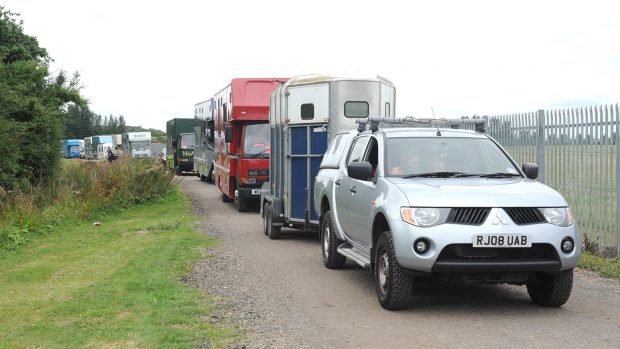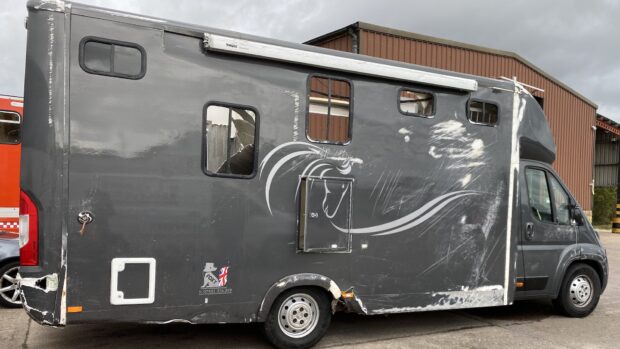If you need to take your horse out and about – whether that’s for competitions and training, a change of scenery for a relaxing ride, or an essential trip to the vets – there are a lot of options available. But should you hire or buy? And do you need a trailer or lorry? There’s a lot to think about when you are considering the pros and cons of owning versus hiring horse transport.
Cost is one of the main considerations as buying a horse lorry in particular is clearly a huge investment, but it’s not just the initial cost that needs to be taken into consideration, maintenance can be a huge factor.
Claire Dolby from Atacanter offers horsebox hire and sales, and says this is one of the main benefits of hiring a horsebox.
“When you hire, you know exactly how much you’re paying, there are no hidden costs and there’s no maintenance connected to it either,” she says.
John Barlow from Barlow Trailers sells and hires horseboxes and trailers and agrees about the maintenance side: “Our vehicles get a 60-point inspection each and every time they go out, and our 7.5 tonne horseboxes are looked after like commercial vehicles. Horseboxes aren’t turnkey solutions. They need to be looked after to keep them safe, prevent breakdowns, and keep them in good condition.”
Tom Janion, managing director of Equi-Trek and Hire-Trek, agrees that maintenance is a significant factor in owning a horsebox, and this is why long-term hire is a growing sector for his company.
“We are now seeing a growing trend for long-term hire as an alternative to purchasing as it allows you to enjoy a new vehicle or trailer without the worry of depreciation or the cost of servicing and MOTS,” he explains.
But, of course, there are downsides to hiring, the main one being that the horse lorry or trailer you want might not be available when you want it, and the time involved in picking up and returning a vehicle or trailer might be significant.
Katie Lewis participates in Concours d’Elegance and veteran showing.
“Our experience of hiring a trailer was good,” says Katie. “The main issue was if I wanted the trailer on a Sunday, I would need to pay for full weekend hire as collection had to be Friday with it being returned on the Monday as the company I used did not open weekends. Weekend hire was a lot more than just a day’s hire.”
Owning a horsebox or trailer removes the issues of availability, but it is not without downsides. There’s the initial cost, finance and maintenance connected, but it has many perks, if you have the budget and storage.
“The convenience factor is a big one with owning a horsebox, and not just in terms of when you want to use it, but the facilities it has too. There’s far more flexibility in terms of design, living, etc, which, if you’re spending a lot of time in the horsebox is really important as it can completely change the experience of a long season,” says Claire.
It’s not just the vehicle that can be hired when it comes to horseboxes, as Ruth Chappell, who owns two horses and is based in Hampshire explains.
“My horse, Geoffrey, needed to go to Rossdales in Newmarket for tests,” she says. “I didn’t have a trailer at that time, so I opted to hire someone with a lorry who could do the whole thing for me. I couldn’t get the time off work, so it was really important to me – a freelance groom at the yard very kindly went with Geoffrey to make sure he had a friendly face.”
Ruby Pepper Butchers has an ex-racehorse who competes in dressage. She has hired both self drive and lorries with drivers and found the latter particularly useful when competing on her own.
“I have hired lorries and trailers with drivers before, especially when I was younger,” says Ruby. “It was great having one less thing to worry about with the driving being done for me. I also didn’t have to find a friend to come with me as an extra pair of hands as the driver was able to do this.”
Another reason to hire could be to try before you buy.
Ally Kelly is a keen amateur rider and blogger. She shows and competes in dressage competitions and she opted to hire a trailer on a long-term basis.
“We’d never had a trailer before, so we hired one for six months before we bought,” says Ally. “It was nice to get mine and my mum’s confidence before buying our own. We hired an Ifor Williams 506 which we felt was a bit small for Mags so when we purchased one we went for the Ifor Williams 511 so he has more room – it was great to be able to try before we bought.”
Another angle to consider with hiring is that you’re not ‘stuck’ with one type of vehicle.
“We have clients who hire different horseboxes or trailers depending on what they’re doing,” says John. “If you’re heading out with friends you might need a bigger lorry. If you’re staying away at a championship, you might want one with a big living area. Or if you’re heading on a long journey to the vets, then you might want a smaller lorry. You can do this when you hire, you can’t when you buy.”
Short-term or day hires are popular with amateur riders, and longer term hires are something that many professional riders consider during particularly busy seasons, to work alongside an owned lorry.
“The longer you hire a horsebox for, the cheaper the day rate becomes,” says Claire from Atacanter. “And it can also help to reduce costs if a professional rider doesn’t need another horsebox all the time, but doesn’t want to hire a transporter and is keen to use members of staff who can drive the horsebox too.”
Tom from Equi-Trek says Hire-Trek offer three different hire options: short, mid-term and long.
“Mid-term, which is anything from two months to 11 months, is very popular for people who don’t want to commit to owning a vehicle and is usually used for the season with six months from March to September being the most popular option,” he says. “We do long-term hire, which is 12 months to 36 months, and is very similar to contract hire with a car, where you never own the vehicle but have a fixed low monthly payment, which includes all the maintenance, warranty and running costs. This is our fastest growing market due to the security it gives people. It also doesn’t get registered on someone’s credit record so has much less of an effect on what they can borrow compared to a finance option.”
Companies will differ in their hiring process, but don’t be surprised if you need to supply ID, driving license and DVLA code, as the latter allows the company to check the details of your license (and what you’re able to drive) as well as the points you may or may not have.
“You can ask to see the MOT and the insurance documents when you hire,” says Claire. “We have self-drive insurance, which is the correct type, but there aren’t many companies that supply this type of insurance and it’s very expensive, so some hire companies may not have it. Do your research.”
When it comes to hiring horseboxes or trailers, John says that reviews from other customers can be very useful, and having a good look around and even filming the condition of the horsebox or trailer before it leaves the showroom can be wise.
“Check your position on the insurance provisions and if the company offers Collision Damage Waiver, take it. Look at the age of the vehicle too. If you’re hiring, expect to have a fairly new vehicle.”
“Make sure you choose a reputable company that has a wealth of experience so that you can discuss your requirements and ensure they are met by purchasing or hiring the right horsebox or trailer for you,” says Tom. “A reputable company will also provide insurance. Unless it is a proper hire company then you will most likely be uninsured and would have a serious issue if stopped by the police or even worse had an accident.
“Also, the safety of the vehicle is a key issue – you don’t want to be hiring an old vehicle and have problems while you are away. Finally, you need to check there is breakdown cover and horse recovery included, just in case the worst happened. Hire-Trek use vehicles that are less than three years old and they come with full equine rescue – it may be a little more expensive, but you get what you pay for!”
Money comes up a lot when horse transportation is mentioned, and it’s easy to see why with small horseboxes having the potential to cost over £40,000, but as John explains, there might be ways to manage this cost.
“A lot of our hires are to people who have bought horseboxes that are not satisfactory and are failing for a variety of reasons. We hear of people who have invested a significant amount of money and have a lovely looking box that has been built on old chassis, which has the potential to make it less reliable,” he says. “Horseboxes are expensive, but if you view it as a longer term cost, look to part exchange it regularly to keep the money in the vehicle and ensure you have something safe to drive, there are ways to manage it.”
You might also be interested in:
Self-drive horsebox hire is a perfect solution for horse owners who do not want the expense of owning and maintaining

Self-drive horsebox hire: everything you need to know

Subscribe to Horse & Hound magazine today – and enjoy unlimited website access all year round
Horse & Hound magazine, out every Thursday, is packed with all the latest news and reports, as well as interviews, specials, nostalgia, vet and training advice. Find how you can enjoy the magazine delivered to your door every week, plus options to upgrade your subscription to access our online service that brings you breaking news and reports as well as other benefits.



